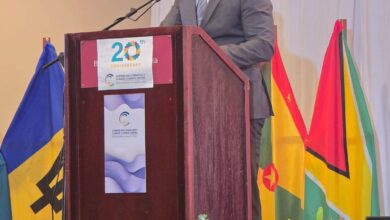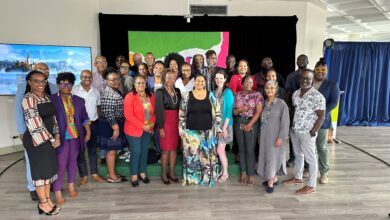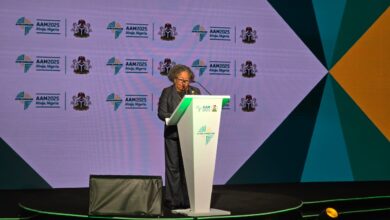PORT-OF-SPAIN, TRINIDAD & TOBAGO – “The workshop has been a tremendous success. It was very well attended, having brought together a diverse group of stakeholders in the regional creative industries. Importantly, this unique forum has enabled them to conceptualize and outline the interests of the industries, and identify how they can be brought forward to the negotiating table as regards the region’s external trade negotiations effort.” This was the view of Mr. Ian Randle, a participant in the forum and President of the Jamaica-based Ian Randle Publishers Ltd. The Caribbean Regional Negotiating Machinery (RNM) and the European PROINVEST/TRINNEX program for the private sector collaborated in organizing the two-day ‘Regional Workshop on the Impact of Trade and Technology on Caribbean Creative Industries’ that took place in Port-of-Spain, Trinidad and Tobago, from October 28. The workshop brought together a group of stakeholders involved in the creative sectors (music; performing/visual arts; motion picture and video; publishing; fashion/glamour; radio, television and cable broadcasting) from across the Caribbean to examine the culture-trade interface, and discuss issues of common and specific concern. The workshop was opened by Hon. Diane Seukeran, Minister in the Ministry of Trade and Industry-Trinidad & Tobago. The feature speaker was Michael ‘Ibo’ Cooper, one of the founding members of the award-winning and internationally acclaimed music band Third World. The RNM’s Services Trade Specialist, Mr. Ramesh Chaitoo, and Mr. Anthony Smallwood, Head of the Delegation of the European Communities to Trinidad & Tobago also addressed the opening ceremony. Mr. Cooper gave a spiritually powerful presentation, in which he highlighted the historical evolution of ‘Caribbean culture’, and its emergence on the world stage. He pointed out that the richness of Caribbean culture stimulates great creativity in a range of areas, and that this should be harnessed so as to improve the lives of Caribbean peoples. Mr. Cooper also underscored that the creative industries need to be embraced by governments and recognized for their contribution to Caribbean societies and economies. A common theme in all the opening remarks and the workshop, in general, was that the region’s creative industries are already very important and have the potential of adding significant new economic value to Caribbean economies. External trade negotiations must, therefore, provide avenues for maximizing trade in creative sectors by securing greater and wider market access for Caribbean cultural goods and services. It was also recognized that domestic policy space must be maintained for governments to support this sector. In this regard, there was spirited discussion on the regulatory aspects and the commercial policy environment of Caribbean countries and their effects on the creative industries. Numerous workshop participants stressed the urgent need to put in place the appropriate regulatory and policy measures for an enabling environment for creative industries, in order to realize their full growth potential. The workshop unanimously agreed that the effective protection of intellectual property rights is critical to the success of all creative industries. Participants were also anxious to see changes in the banking and financial system regarding financing policies and practices. The conceptual framework for these deliberations was a keynote presentation by Mr. Chaitoo that provided an overview of the main elements of services trade negotiations relevant to the cultural industries in which the Caribbean is involved. Leading international experts and executives invited as resource persons as well as key representatives of Caribbean creative industries and businesses brought perspective on trends as regards digitization and the global convergence of information and communication technologies and the rapid and complex developments taking place in communications, interconnection, entertainment and new media industries. The intention was to draw lessons for the region’s music, entertainment, visual/performing arts, publishing and new media industries on a range of cross-cutting policy and industry issues. There was discussion of the potential of e-commerce to transform the way in which the region’s creative industries penetrate international markets, in light of advances in information and communication technologies in recent years. Panel discussions, intended to facilitate more targeted interchange on sub-sectors of the region’s creative industries, focused on: the music industry; audio visual industries; business development, financing and private investment in creative industries; publishing; glamour fashion; and, dance, theatre and the performing arts. Evident from the panel discussions were the success stories as regards accessing foreign markets. Mr. Kama Maharaj, of Sacha Cosmetics, a discussant on the Panel on Business Development, Financing and Private Investment in Creative Industries, underscored that this Trinidad & Tobago firm is effectively competing on the world stage, and is sought after to provide cosmetic products and services to internationally renowned beauty pageants. With a staff of 150, he noted that the company’s cosmetic products are in demand because of their high quality and also because of investment in cutting edge technology for their website, “enabling myriad of e-commerce opportunities.” Success stories as regards the regional publishing industry were also singled out. Focus was on regional publishers like Ian Randle Publishers, involved in scholarly and academic books, but also on the only two magazine exports from the Caribbean – MACO and SHE Caribbean. Mr. Lawrence Duprey, head of the CL Financial Group, which has diverse investments in many sectors across the Caribbean including creative industries, was also part of the Panel on Business Development, and presented his insights on what the creative industries need to succeed. He spoke highly of the potential of the region’s creative industries, noting, “they represent the growth industries of the future.” Mr. Duprey said, “music, as a key sub-set of the creative industries, is one of the only industries that is able to penetrate markets at relatively low costs, and therefore as a medium it can facilitate in building global brand recognition. It is, therefore, incumbent that regional governments effectively support the creative industries, through incentive programs and the creation of the necessary enabling environment with respect to financing institutions, given their critical role in adding new economic value to Caribbean economies.” As an important and unprecedented forum in the region, participants hailed the encounter as a success, lauding the workshop organizers for putting the event together. The issues raised and the recommendations gleaned over the last two days will form the basis for more specific and directed interchange between Trade Ministries, Ministries with responsibility for culture and creative industry stakeholders. The aim is to better develop an understanding of and craft development policies and trade negotiating positions regarding the culture-trade interface. Representing the RNM at the workshop were: Mr. Chaitoo; Ms. Jan Yves Remy, Services Analyst; Ms. Lisa Callender, Private Sector Liaison; and, Mr. Nand C. Bardouille, Communications Officer.
News Letter
Subscribe to our mailing list to get the new updates!
Check Also
Close





